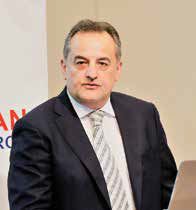Observing the reactions from the majority of our members and the members of other chambers, our general impression is that the most of the existing investors would re-invest in the Serbian economy, if they were given a chance, if the trend of changes in the country were to continue, and if the already applied changes were to develop and evolve in more detail and more pragmatically while following the pace of modern businesses in the world.

What do your market analyses show about the changes in the business climate in Serbia? What would you single out as key steps forward?
— A number of analyses indicate that that Serbia explicitly invests more and more in the healthiest sectors of the economy (IT sector, agricultural sector, tourism, education, energy), and this is particularly important, that the country has carried out activities related to strategic digitization of businesses and social eco-systems. If we are talking about problems, we need to underline again the issue of corruption, the legal system, the tax policy and supervision, and the efficiency of public administration. I would add here that we expect to see an improvement in the issues relating to taxation and the system’s general financial postulates, following the Ministry of Finance implementing new legislative measures since December.
As a special success of Serbian society and the state, I would like to single out the introduction of a dual education system, which created the prerequsites for Serbia to join industrialized economies, such as Switzerland’s, Germany’s and Austria’s, where, after graduation, students are largely prepared for working and work-related specificities in modern companies. Of course, the political and security situation in the country is also of great importance, as is the stable exchange rate of the dinar.
Which challenges are we going to have to tackle in 2019?
— Next year will be challenging for both the state administration and economic eco-system. After the successful year 2018, the ongoing trend should be perpetuated with a more ambitious plan, the more obvious projects of Serbian companies and more effective fight against the remaining negativities in the economic system. On the other hand, not only successes are inherited, problems are too so the ‘reminders’ directed primarily at the Prime Minister Brnabić’s cabinet will continue to be made, that is for sure. It is also necessary to make the general business procedures, especially those related to public administration, as efficient as possible. Business people must feel that the public administration is working for them, not vice versa. I do not advocate the dominance of the interests of the private economy over the citizens or the public sector’s interests, but let’s not forget that tax is levied on stimulated, agile business entities that are confident that the state is doing everything in its power to create more efficient economic conditions for them.
Another aspect is certainly focusing on supporting Serbia’s most successful industries such as ICT which in 2018, achieved an incredible success, generating 1 billion euro worth of exports and having over a 10% share in the Serbian GDP. In addition to this branch, I would like to mention the need for further engagement regarding the so-called agrotech businesses, based on modern technological innovations. In 2019, the SSCC will actively support the
transfer of knowledge and investments of the Swiss agro-tech companies to Serbia, which they consider to be an ideal agro-oasis of Europe.
Can we claim that we are already experiencing positive effects of dual education in Serbia?
— Yes, by all means! Since the beginning of this year, the SSCC’s has adopted a clear stance regarding the support for the dual education process and is an active factor in the developments related to this project. This year, we had several important events dedicated this issue, which culminated with a great conference held in October at the Hilton Hotel, when over one hundred VIP guests participated in an open dialogue, such as Minister Šarčević, President of the Serbian Chamber of Commerce and Industry, Marko Čadež, Assistant Minister of Education Dr. Gabrijela Grujić, the Swiss Ambassador, H.E. Philippe Guex, and one of the leading European experts on dual education, Dr. Ursula Renold. This year alone, 12 new educational profiles have been created out of a total of 32, and over 3,500 students in Serbia are participating in dual education, while more than 600 companies want to get involved in this type of cooperation between education and business. These are all successful arguments that no other country in the region can boast about.
As a GDPR expert, what is your message for Serbian companies?
— GDPR is not only a buzz-word, as it is flippantly interprented in certain insufficiently uniformed circles. Although Serbia is not an EU member, we should not forget the recently adopted Law on Personal Data Protection, which to a great extent, contains GDPR’s postulates. In addition, the number of foreign, primarily EU citizens is increasing and their personal data are stored in the databases of public companies and institutions, as well as with service organizations. The fact that all these data are digitally deposited in the computer system creates an opportunity for malicious subjects to access data by incapacitating the protection system – data is then copied to their systems and / or worse, it is “locked” or made public. Any of the mentioned breaches can expose a company that did not preserve such data to the possibility of serious lawsuits that carry high penalties, not to mention the loss of confidence in such firms. In any case, a lot is being done to raise the level of awareness of all employees in companies. I would like to underline once again – the greatest risk for the system is not the system itself, but unfortunately the so-called “human factor”, namely the ignorance and unwillingness of employees to behave in a an adequate manner and to defend from malicious activities.